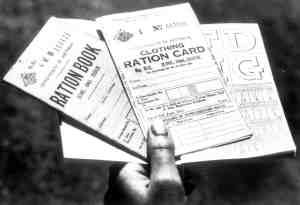As in World War 1, the Commonwealth Government imposed a large number of new controls over people's lives. They did this through the authority of the National Security Act of 1939. This Act did two major things:
- it effectively overrode the Constitution for the duration of the war, giving the Commonwealth power to make laws in areas where it did not have that power under the Constitution; and
- it effectively overrode the power of parliament, by giving the Government power to make regulations, that is, laws that required only the signatures of some Ministers and the Governor-General.

Like to copy this image? Please click here first
(AWM 42770)
The Government used its powers to make a huge number of laws and regulations affecting all areas of people's lives. Among these were:
- the reduction of the Christmas - New Year holiday period to three days;
- the restriction of week-day sporting events;
- blackouts and brownouts in cities and coastal areas;
- daylight saving;
- increased call-up of the militia;
- the issue of personal identity cards;
- increased enlistment of women into the auxiliary forces;
- regulations allowing strikers to be drafted into the Army or into the Army Labor Corps;
- the fixing of profit margins in industry;
- restrictions on the costs allowed for building or renovations;
- the setting of some women's pay rates at near-male levels;
- internment of members of the Australia First organisation;
- controls on the cost of dresses;
- rationing of clothing, footwear, tea, butter and sugar;
- the banning of the Communist party, and the Australia First Movement for opposition to the war;
- formation of a Women's Land Army;
- the pegging of prices; and
- prosecution of about 1000 conscientious objectors, and the imprisoning of some of them.
To investigate this aspect of the Home Front experience by using evidence from the time, see Home Fronts at War, Ryebuck Media for ANZAC Day Commemoration Committee of Queensland.
More about the book HOME FRONTS AT WAR





